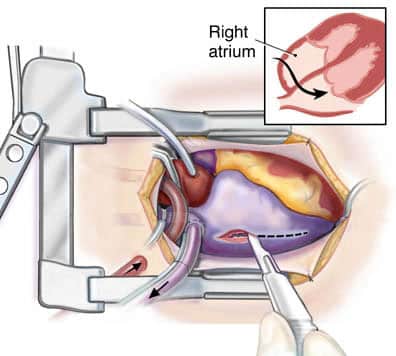MINIMALLY INVASIVE CARDIAC SURGERY
Minimally Invasive Cardiac Surgery (MICS) is an advanced surgical approach that offers numerous benefits over traditional open-heart surgery. It involves using small incisions and specialized instruments to perform complex cardiac procedures with precision, while minimizing trauma to the surrounding tissues.

MINIMALLY INVASIVE CARDIAC SURGERY
Minimally invasive cardiac surgery is a cutting-edge technique in which heart surgery is performed through a small incision. This method is known for faster recovery, less pain, and minimal complications, helping the patient return to normal life quickly. However, with the latest advancements in minimally invasive cardiac surgery, it is now possible to perform cardiac surgery, be it any valve replacement or coronary artery bypass surgery, through a small 2-inch incision and sometimes through a keyhole only!
MICS can be employed for various cardiac conditions, including coronary artery disease, valve disorders, atrial septal defects, and more.
Key Features of Minimally Invasive Cardiac Surgery:
- Smaller Incisions: MICS utilizes small incisions, typically 2-3 inches long, compared to the larger incisions required in traditional open-heart surgery. These smaller incisions result in reduced scarring, less pain, and faster healing.
- Reduced Blood Loss: Minimally invasive techniques employ advanced technologies, such as video-assisted equipment and robotic assistance, which allow for greater precision and control during surgery. This results in reduced blood loss, minimizing the need for blood transfusions.
- Shorter Hospital Stay: MICS often allows for a shorter hospital stay compared to traditional surgery. The faster recovery time and reduced post-operative complications contribute to an earlier discharge from the hospital, enabling patients to return to their daily activities more quickly.
- Faster Recovery: The minimally invasive approach results in less trauma to the body, leading to a faster recovery. Patients may experience less pain and discomfort, require fewer pain medications, and resume their normal activities sooner compared to open-heart surgery.
- Lower Risk of Infections: The smaller incisions in MICS reduce the exposure of surgical wounds to potential contaminants, lowering the risk of infections. This is especially beneficial for individuals with compromised immune systems or a higher susceptibility to infections.
- Improved Cosmetic Outcome: The smaller incisions and minimized scarring in MICS offer improved cosmetic outcomes, which can positively impact a patient’s self-esteem and quality of life.
- Comparable Effectiveness: Minimally invasive cardiac surgery is as effective as traditional open-heart surgery in treating various cardiac conditions. It achieves similar outcomes in terms of long-term survival rates, symptom relief, and improvement in cardiac function.
It is important to note that not all cardiac conditions or patients are suitable for minimally invasive approaches. The decision to undergo MICS is made by a multidisciplinary team of cardiac specialists based on individual patient factors, the complexity of the condition, and the surgeon’s expertise.
Minimally invasive cardiac surgery represents a significant advancement in cardiac care, providing patients with a less invasive option that promotes faster recovery, reduced complications, and improved overall patient experience.
Our cardiac surgeon Dr. Sudhanshu J Agnihotri use minimally invasive techniques to treat complex cardiac conditions.

